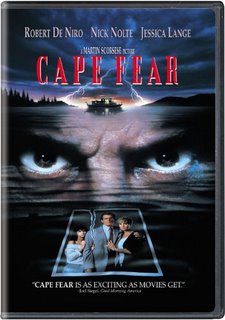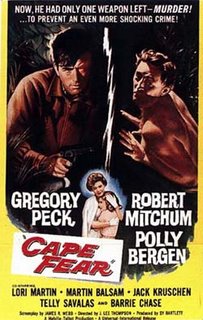Capes Fear


(Not a misprint; I'm talking in plural, like the womens).
Continuing Marie's psych studies to garner psychological themes from movies, we saw Martin Scorcese's 1991 remake of Cape Fear (1962).
Both of these movies are so well-made, and Scorcese's version (or let's say writer Wesley Strick's version) so deeply layered, that it was very disappointing for me to feel that, despite being expertly crafted, the story is ultimately unprofitable on a philosophical or personal level.
It was certainly exciting, terrifying, plumbed the depths of the human psyche, but ultimately it had nothing to redeem it, not even a protagonist we can sympathise with.
In the behind-the-scenes featurette, Nick Nolte says that it's about stripping away the masks we wear, and sometimes violent suffering is the only way to do that. I guess so, Nick, but I'd prefer to get that message from a film like Sideways, which talks about masks in a much gentler but still powerful way.
Strick's version of Cape Fear is achingly empty of hope. Danielle's voiceover at the end is a message of stoicism, a message of just pressing on.
From the how-to-make-a-movie department, there were some great touches. Layering the Max Cady character as a psychotic, Bible-quoting avenging angel was an interesting touch that made his character really, really scary.
Using the original music from 1962 was inspired, but also made the movie idiosyncratic, perhaps too much for mainstream audiences in 1991. However, Scorcese says it was the movie that earned him the most money of all his films.
Psychological themes aplenty here, though:
- Fear
- Obsession
- Sexuality
- Repression
- Deception
- Dysfunctional families
Because we were so dissatisfied with the remake, we thought we'd check out the original. What a difference 30 years makes! The original can't even say the word "rape", yet the remake shows some pretty gruesome verbal and visual violence (nothing explicit though, except Robert de Niro taking a bite out of Illeana Douglas' cheek).
That brutality then combined with Cady's charm as he tries to seduce Danielle is truly creepy. Climbing the walls creepy.
As you might expect, the original was much simpler and more straightforward than the remake, but the acting was top notch. Robert Mitchum especially was such a great actor, offering a very convincing combination of charm and animality (is that a word?).
However, again with this one I wondered why? It's another entertaining, terrifying wild ride, but at the end the only message I get out of it is that some people are so bad they should be locked in a cage forever. What gives?
Maybe the thing I'm missing with movies is that they ask a question rather than offer a statement. Maybe this story - in both its incarnations - is asking how do you confront relentless evil? How do you beat it? Do you take the moral high ground, or play the bastard at his own game?
What neither Gregory Peck's nor Nick Nolte's character did was attempt to show kindness and grace - a powerful weapon against evil. Of course, that would make it an entirely different film, but one I would be more interested in seeing. Showing grace tests the strongest of us.
Maybe I should stop looking for the transcendent or the uplifting in every movie, and just see how well they've designed their roller-coaster ride. In both cases, these story creators have done a superb job. It's just not the kind of ride I would choose.



0 Comments:
Post a Comment
<< Home